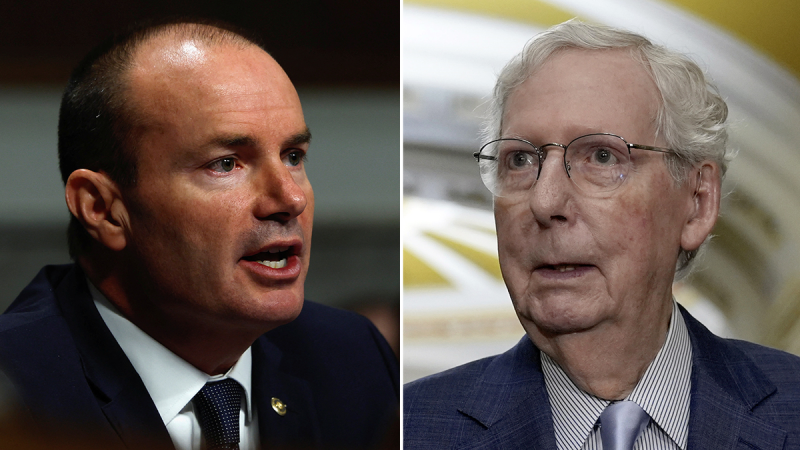The unnoticed election that could determine the future

With the election on the horizon, America’s eyes are glued to battleground states. Days after the national election, however, a new battleground will emerge in the United States Senate. Even if Donald Trump wins the White House, he could quietly lose his ability to govern in the Senate.
With Sen. Mitch McConnell stepping down, Senate Republicans will choose a new leader for the first time in 18 years this November. With this decision, we have an opportunity to decide how the Senate conducts business going forward – and the ability to either strengthen or undermine a second Trump term.
The Stakes
Should Trump win a second term, he will have only four years to implement his agenda and reverse the tide of radical progressivism swamping our government and weakening our country. With the uncertainty of 2026 midterms and the inevitable legislative lethargy during campaign seasons, those four years for lawmaking suddenly become much shorter. We cannot afford to lose any time in energetically passing America First policies.
The Divide Within
Practically all Senate Republicans understand that four more years of recycled Biden policies would be a disaster for millions of Americans and their families. But not every Republican in Congress is aligned with Trump’s vision for the country. Some see themselves as stewards of a more moderate brand of conservatism. Still others disagree on policy areas from trade to immigration to foreign policy.
The Path Forward
How Senate Republicans choose to conduct business going forward – and whom they choose as a leader – will determine whether those disagreements lead to infighting that foils President Trump’s agenda, allowing Democrats the upper hand in policy battles. If we hope to quickly pass a legislative agenda that will make America great again, we need to find a way to resolve and overcome these differences.
Even with a Senate majority, Republicans will probably lack the 60 votes needed to pass most legislation, including crucial spending bills that define what the executive branch can and can’t do. Trump’s second term could turn into a series of compromises that accomplish little.
Moderates will be tempted to join Democrats to pass funding bills that tie Trump’s hands. Per usual, the uniparty will write these bills in a backroom, load them up with swampy priorities and hold the government hostage with shutdown threats unless Trump and his allies back down.
To avoid the gridlock of business as usual, it is imperative that we structure the Senate in a way that gives individual senators real legislative power, not just lip service. We must be able to amend bills, debate issues openly, and advocate for conservative priorities in a meaningful way. Earlier this month, in a letter to my Senate Republican colleagues, I offered a few practical proposals to get there, which I will summarize here.
First, we should resolve our differences through votes on amendments. Most Americans would be shocked to learn that their senator often cannot offer amendments to legislation. Since former Senate Democratic leader Harry Reid centralized control of the legislative process in the early 2010s, it has been common practice for the majority leader to block all other senators from offering amendments.
The best way to resolve inevitable disagreements is to allow senators to vote on amendments to legislation. This process allows us to see whether various proposals have enough support to pass. Rather than throwing together massive take-it or leave-it bills, we can build consensus by crafting the legislation, provision by provision, on the Senate floor until we reach consensus. This is how the Senate was intended to function, as it did until recent years.
Second, we must have time to consider legislation. Going forward, the Senate majority leader should establish an annual schedule for considering funding bills. With a reasonable schedule, Congress and the White House will have advance notice to consider and refine proposals for how to fund the government while tackling the bloated administrative state.
When we must consider omnibus funding legislation, which funds the entire government in one bill, we should debate and amend it on the Senate floor for at least four weeks. Those of us planning to advance Trump priorities in such legislation can offer and refine those proposals until they have enough support to pass. The negotiation would happen in the open, rather than in a backroom between House and Senate leadership.
Third, Republicans must be organized to strategically advance our agenda. Senate Republicans should ask our next leader to offer clear goals at the start of each year to be ratified by our whole conference. This will help to focus our firepower to advance the policies hardworking American families have been promised.
As an extension of this, the Republican leader should present a strategy to achieve victories on every piece of must-pass legislation. We can mitigate infighting by focusing on a shared strategy.
As a last line of defense against Democrats gaining the upper hand, Republican leadership should whip for or against a bill only after first getting the support of a majority of our conference. This protects us from being pressed into funding harmful Democratic policies, as often happens when must-pass legislation is up against a critical deadline.
The Bottom Line
The bottom line: If President Trump doesn’t have a strong Senate committed to executing his legislative vision, his second term will be sabotaged. His appointees could be left unconfirmed, his policies undermined, and his power to govern steadily chipped away by a weak and divided Senate, quietly handing his opponents the victory they couldn’t win at the ballot box. The consequences would be devastating – not just for his second term, but for the country.
A reformed and functional Senate will be essential for translating a Trump victory into real, lasting change. If we want to make America great again, we need a Senate that can lead again.




